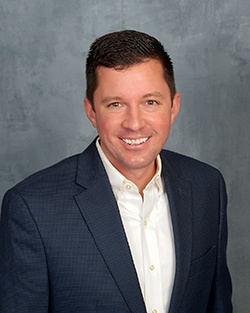
PHLYTRAC Vehicle Telematics Program gives dynamic insights into driver behavior, vehicle stats, and more to help churches lower the risk of driver-related accidents.

Vice President
Philadelphia Insurance Companies (PHLY)
Church Executive: Tell us about PHLYTRAC.
Andrew Shockey: We officially launched PHLYTRAC in 2016, but it was the result of about 10 years of efforts prior to that. As with many carriers, our auto line of coverage sustained losses.
Meanwhile, GPS technology was getting faster, better, and cheaper, and we wanted to see what it could do in terms of prevention.
There is a lot of avoidable tragedy when it comes to motor vehicle accidents. To address it, we felt we could use GPS technology to identify unsafe driving habits.
With more than 1 billion miles now logged in PHLYTRAC, we’re happy to say that the investment we made in launching the program is having the effect we hoped for. Customers with PHLYTRAC are seeing a 19% reduction in loss frequency compared to accounts without PHLYTRAC.
CE: Among church clients, who do you see using PHLYTRAC most?
Shockey: Churches with schools, of course, but really any church, whether they have just one van, one bus, or a whole fleet. It’s all worth protecting as an extension of care.
Unfortunately, AI is scaring people right now; who wants Big Brother in their church van? But if that van is being used on irregular routes — for mission trips to other states, for instance — PHLYTRAC gives church leaders a way to care for their people beyond, “We hope to see you back soon.”

With PHLYTRAC, I’m proud to say we continue to use GPS technology/data in a responsible way, one that serves and supports our clients. Just because a church doesn’t have a fleet of 50 vans, doesn’t mean it doesn’t have a major exposure. What if your one church van is involved in a rollover accident while carrying your members? Whether the driver is at fault or not, your church is now in the headlines.
When someone asks what Philadelphia Insurance will do with all this data, it’s a fair question. I’ve always responded that everything we’re doing with it now — and anything we do with it in the future — centers on service for and support of our policyholders.
For anyone who is skeptical or has Big Brother concerns about this technology, I’d ask for the opportunity to personally address those. I would welcome a direct, private conversation about what we’re not doing.
CE: Many churches rely on volunteer drivers. How have those individuals reacted to the use of PHLYTRAC?
Shockey: It depends on how the technology is presented. First and foremost, it should be upfront, open, and unapologetically about care and safety, period. After all, that’s why a driving record needs to be provided before a person is given keys to a church vehicle; it’s just basic due diligence. Stated simply, the church is responsible at all times for who is entrusted with its vehicle keys.
If someone takes the church van and does something they shouldn’t be doing with it, it enables church leaders to address that behavior — which is important because that vehicle is a congregational asset, not a personal one. Most often, though, this is the exception; we find that people are doing the right, honest, good thing with these vehicles. The GPS data actually also shows that.
Just because a church doesn’t have a fleet of 50 vans, doesn’t mean it doesn’t have a major exposure. What if your one church van is in a rollover accident while carrying your members? Whether the driver is at fault or not, your church is now in the headlines.
So, looking at it another way, using PHLYTRAC positions the church to say, “Good job today,” or “Thank you for making sure all of our members were belted in during that trip.” It opens up an opportunity for positive reinforcement of the driving behaviors that are usually being exhibited, anyway.
GPS technology can also help you produce a pattern of behavior that’s teachable and coachable. For instance, you might have a goodhearted volunteer driver who doesn’t often tow a trailer, so they don’t know to increase their following distance. In that case — before a major accident occurs — you can spend some time with him or her in the parking lot discussing stopping distance: “When loaded, we need more time on the brakes because of the weight.” No one loses their job. No one loses their standing in the church over it. You ease those fears.
CE: What out-of-pocket costs can a church expect to pay for PHLYTRAC?
Shockey: If they’re a policyholder of Philadelphia Insurance Companies with our commercial auto coverage, I’m happy to say the out-of-pocket cost is zero. It’s 100-percent paid for by Philadelphia Insurance.
CE: Can a church expect to realize any cost savings by using this technology?
Shockey: Yes. First of all, it has been proven over and over that when a vehicle is driven better, there is a savings returned to the policyholder. There are fuel savings. The wear-and-tear on the tires is slowed.
In fact, we’re currently working on a new partnership that will give our policyholders with PHLYTRAC access to discounted auto services.
CE: Any quantifiable safety improvements you can share among churches using PHLYTRAC?
Shockey: Yes. For whatever reason, church clients often feel the need to give us a call (or their agent calls us) to tell us about questionable driving behavior happening at their church, which they learn about in their PHLYTRAC data. They’re nervous; they forget to exhale.
“Do you need to report a claim?” we ask. No; no accident happened — just a bit of behavior that’s embarrassing. A church driver hit the brakes too hard, for instance. Can they expect Philadelphia Insurance to send a bill, now?
That answer is no.
In fact, they’re surprised when all they hear from us is gratitude. Would their church benefit from additional training? That’s one option. Or maybe some policy or procedure ideas? That’s another.
That church leader might need to have a conversation with the driver in question, but at least it’s based on facts gathered internally versus a 6 o’clock news story, or from someone who doesn’t like the church and wants to stir up trouble.
— Reporting by RaeAnn Slaybaugh


